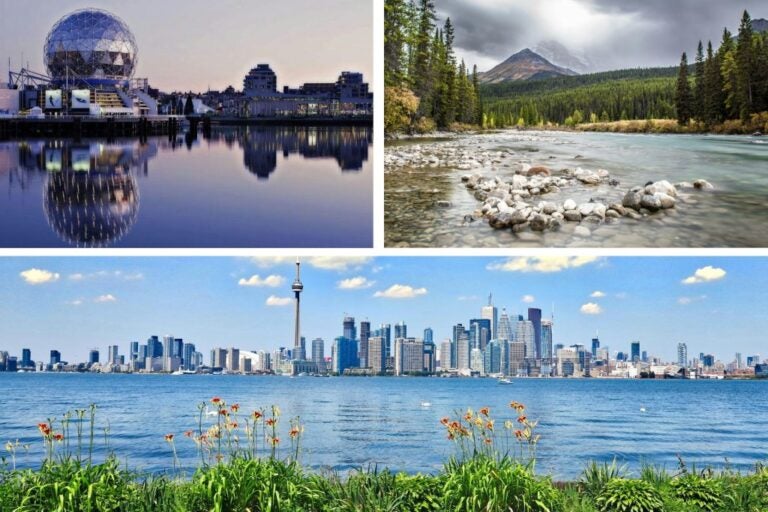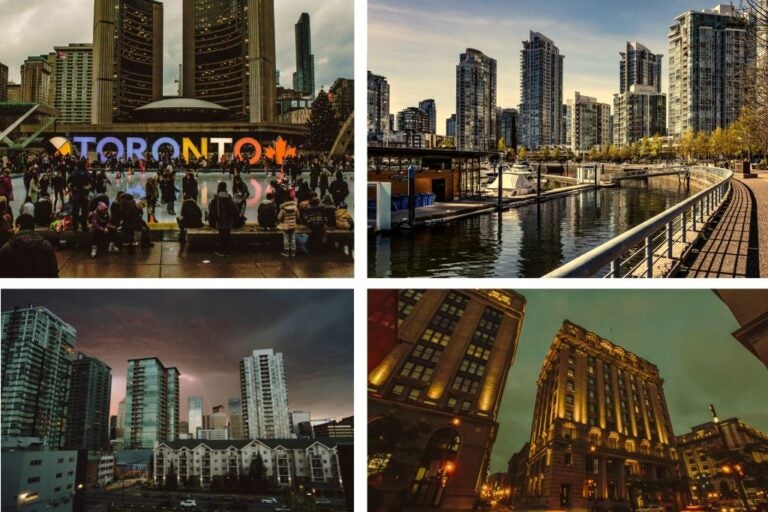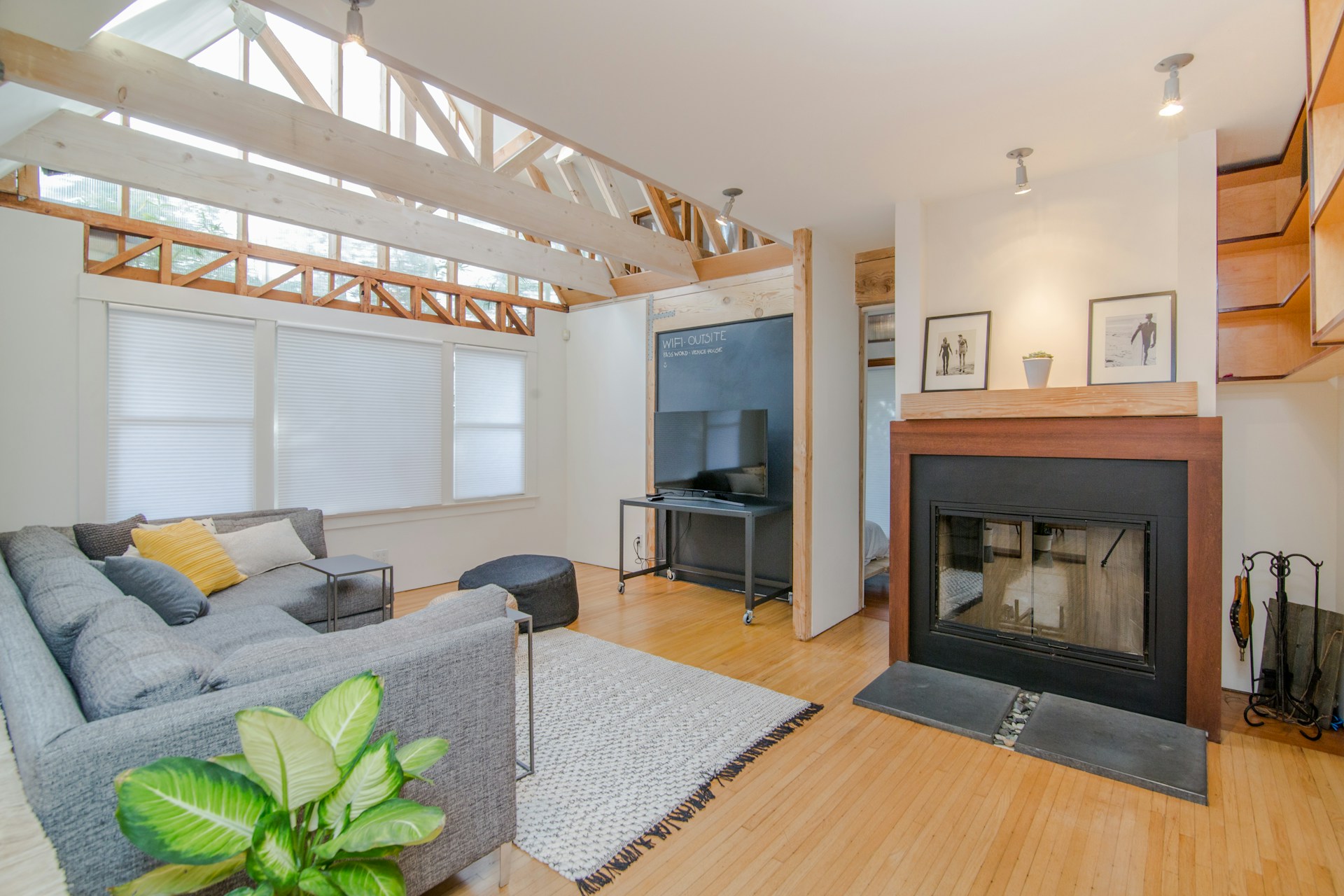Becoming a Digital Nomad in Canada: Everything You Need
Now you can settle in Canada as a digital nomad. Don't know where to start? Read everything we have to say about it in this guide.
Canada is an increasingly popular destination for digital nomads thanks to its modern infrastructure, high quality of life and breathtaking scenery. Cities such as Toronto, Vancouver and Montreal offer a perfect blend of culture, technology and nature, making them ideal locations for those looking to work remotely while enjoying an active lifestyle. In addition, the country is known for its stability, security and hospitality, which facilitates the integration of foreign professionals.
Another key factor that makes Canada an attractive destination is its excellent connectivity. Both at the digital level, with fast and reliable internet connections, as well as transport, with direct flights to many global destinations. With its modern coworking spaces, ample networking opportunities and events dedicated to startups and technology, Canada is an ideal place for digital nomads who want to work and expand their professional networks.
Why choose Canada to live as a digital nomad?
One of the main reasons for choosing Canada as a destination for digital nomads is its high quality of life. Toronto and Vancouver are among the best cities in the world for their infrastructure, efficient transport and access to quality public services. What’s more, Canada’s multicultural environment facilitates the integration of foreigners and the expat and digital nomad communities are well established, with networking opportunities at local events and coworking spaces.
In terms of connectivity, Canada is excellent. Cities such as Montreal, Toronto and Vancouver have fast and reliable internet networks, essential for working remotely. In addition, Canada’s proximity to the USA and Europe makes it a strategic hub for travel to other destinations. Not only that, the country’s unique nature, including national parks, mountains, lakes and forests, offers endless opportunities for outdoor activities, making Canada an ideal place not only for work, but also for leisure and adventure.

Visas allowing legal residence in Canada
As of 2024, Canada has launched a visa for digital nomads under its Tech Talent strategy. This visa allows remote workers to live and work in Canada for up to six months without the need for a specific work permit. It is designed to attract digital professionals to work online for foreign employers. During their stay in Canada, nomads can explore the country and, if they find employment with a Canadian employer, they can apply for a temporary work permit and extend their stay for up to three years. In addition, there are other visas that may be of interest as a second option
| Visa Type | Description | Duration | Renewal/Extension |
|---|---|---|---|
| Digital Nomad Visa | Allows you to work remotely for foreign employers. | Up to 6 months | Option to apply for a temporary work permit if you find employment with a Canadian company. |
| Work Permit | Granted to individuals with a Canadian job offer and in limited cases to remote workers. | Up to 3 years | Can be extended or changed to a permanent residence visa if the requirements are met. |
| International Experience Canada (IEC) | Available to citizens of certain countries that have bilateral agreements with Canada. | Up to 2 years | Cannot be extended. |
Where to live and work as a digital nomad in Canada
1. Top cities for digital nomads
Canada is a very attractive destination for digital nomads because of the quality of life it offers in several of its major cities. Want to know which ones we recommend to establish yourself in the country? Let’s find out more about the lifestyle of each of them:
- Toronto: Canada’s largest city, with a large international community and multiple networking opportunities. Toronto is a major financial and technology centre, ideal for those seeking connectivity and resources to work remotely.
- Vancouver: Renowned for its natural environment and active lifestyle, Vancouver is a haven for digital nomads who enjoy outdoor activities such as hiking, skiing and cycling, as well as having a strong tech scene.
- Montreal: With a more affordable cost of living than other major cities, Montreal is known for its rich culture, architecture and freelance communities. It is an excellent choice for those looking for a more artistic environment.
- Calgary: Famous for its proximity to the Rocky Mountains, Calgary offers a balance between urban life and access to nature. The city is growing as a hub for startups and entrepreneurs.

2. Accommodation options
There’s a wide variety of accommodation options in Canada tailored to the needs of digital nomads. Co-living spaces have become fashionable among digital workers. If you are not yet familiar with these spaces, we provide you with more information in our post: Best co-living spaces for digital nomads and entrepreneurs.
- Co-living spaces: These shared spaces are ideal for remote professionals looking to live with other nomads and share experiences. Notable names in Canada include Roam and The Collective.
- Hotels: Many hotels offer long-stay rates with services such as high-speed internet. Options such as Residence Inn by Marriott or Sonder are designed for longer stays and are popular with those looking for flexibility.
- Home exchange: Another option is home exchange, which allows digital nomads to stay in Canada while someone else lives in their home. Platforms such as HomeExchange facilitate this process.
3. Coworking spaces
Canada has an excellent coworking infrastructure, with options for all tastes and budgets. Here you can find out more about some of the most notable coworking spaces in Canada when it comes to quality of services and rates:
- WeWork (multiple locations): This offers flexibility with plans starting at CAD 350 (EUR 230) per month.
- The Network Hub (Vancouver): A space focused on community and collaboration, with fees starting at 150 CAD (100 euros) per month for limited access.
- La Gare (Montreal): This combines work areas with events for remote professionals. Monthly plans start at 200 CAD (132 euros).

4. Public spaces with good internet connection
If you are planning your trip to Canada, either as a tourist or with the intention of establishing yourself as a digital nomad in this country, we recommend that you contract the Holafly eSIM for Canada. This way, you can enjoy a fast connection with unlimited data anywhere in the country. You can also connect to Wi-Fi in most public spaces:
- Public libraries: Libraries in cities such as Vancouver, Toronto and Montreal offer free high-speed internet access and comfortable workspaces.
- Coffee shops: Many coffee shops such as Starbucks and independent coffee shops such as Café Olimpico in Montreal and JJ Bean in Vancouver are known for their friendly atmosphere and good Wi-Fi connections.
Taxes to be aware of in Canada
1. Local taxes for digital nomads
In Canada, if a digital nomad stays for an extended period of time or settles in the country, he or she may be considered a resident for tax purposes. Under Canadian law, you can become a tax resident if you spend more than 183 days in the country during a year or if you establish significant ties, such as having a home, family relations or business connections. This means that if you are in this situation, you may be liable to pay tax on your worldwide income tax on your worldwide income regardless of where it is generated.
For those who do not meet this tax residency threshold, they may only be taxed on certain types of income earned in Canada. That said, reviewing your tax status with a specialist advisor is advised to ensure that you comply with all regulations.
2. Double taxation treaties
Canada has double taxation treaties with several countries, which can benefit digital nomads who spend time in the country. These agreements are designed to avoid double taxation, which means that if you pay tax in your home country, you may not have to pay tax again in Canada or you may receive a tax credit. Some of the countries with which Canada has such treaties include Spain, Mexico, France, the USA, among others.
If you are a tax resident in Canada and in another country, you can benefit from these treaties to reduce your tax burden. In this regard, it is essential to review the specific terms of the treaty between Canada and your home country to better understand your tax obligations.
Important: If you are a frequent traveler and want to stay connected without worrying about expensive roaming or looking for a new SIM at every destination, Holafly’s subscription plans are for you. With a single eSIM, enjoy internet in more than 170 countries for a fixed price and no surprises on your bill. Travel without limits and connect easily and securely! 🚀🌍

Health insurance and quality of health service
1. Access to the public and private health system
The public health care system in Canada is known for its high quality and universal coverage for permanent residents and citizens through Medicare. However, digital nomads and other foreign workers often do not have immediate access to this system. To access public care, it is necessary to have a visa allowing residency and to register with the relevant provincial or territorial system, which can take up to three months. During this period, it is essential to have private health insurance.
On the other hand, there are several private health insurance options for digital nomads who do not qualify for Medicare. These insurances allow access to private clinics and hospitals, where waiting times are usually shorter.
2. Recommended health insurance for digital nomads
It is important to note that uninsured health care costs can be very high in Canada, so having adequate coverage is essential. For digital nomads working in Canada, some of the most recommended international health insurances include:
- SafetyWing: Designed specifically for digital nomads, it covers medical emergencies, hospitalisation and evacuation in case of emergencies.
- World Nomads: Another popular option that covers both medical emergencies and outpatient care around the world.
- Cigna Global: This offers personalised health plans for expatriates and digital nomads, with international medical coverage.
3. Quality of medical care
The quality of medical care in Canada is widely recognised worldwide. Hospitals and clinics have modern equipment and highly trained medical staff. In larger cities, such as Toronto, Vancouver and Montreal, it is common to find English and French-speaking doctors and health workers. In some areas, it is also possible to find professionals who speak other languages, especially in culturally diverse urban centres. The hospitals most recognised for their quality are:
- Toronto General Hospital: Part of the University Health Network (UHN) hospital network. The centre is one of the most important research hospitals in the country and stands out for its care in areas such as transplantation, cardiac care and complex treatments.
- Vancouver General Hospital (VGH): Also highly regarded, especially for its focus on specialised care and emergency medicine.
Daily life in Canada
1. Transport and mobility
In Canada, transport and mobility are efficient and adapted to different needs. If you plan to drive, you can use your foreign licence for a limited period, depending on the province you are in. Subsequently, you may need to validate it or apply for a new one through the provincial transport offices.
In terms of public transport, major cities such as Toronto, Vancouver and Montreal offer comprehensive options such as trains, buses, underground trains and trams. What’s more, taxi and ridesharing services such as Uber and Lyft are available in most urban areas, making it easier for digital nomads to get around.
2. Financial management
Some of the most recommended banks in Canada for foreigners include RBC (Royal Bank of Canada), Scotiabank, and TD Canada Trust. These institutions offer special accounts for new residents, often with no fees for the first year. In addition, digital banks such as Tangerine and Simplii Financial are excellent options for those who prefer the convenience of online banking, with no monthly fees and low fees for international transactions.
For cash withdrawals, ATMs are widely available throughout the country, both in urban and rural areas. However, it is important to consider that some banks charge additional fees for international withdrawals and conversion rates may vary depending on the bank. In general, using banks that offer foreign fee waivers or low-cost accounts is advisable.
3. Food
When it comes to shopping in Canada, the main supermarket chains are Loblaws, Metro, Walmart and No Frills, the latter of which is a popular budget option for locals and expats. The average cost of meals depends on the region, but generally speaking you can save by shopping in supermarkets and preparing food at home.
Eating out can range from budget restaurants to high-end options. A meal in a casual restaurant can cost between 10 and 20 CAD (7 to 13 euros), while in mid-range restaurants, the cost can be between 20 and 40 CAD (13 to 27 euros). Digital nomads often recommend sampling local cuisine at food courts or markets such as St. Lawrence Market in Toronto or Granville Island Public Market in Vancouver, which offer fresh produce and fast food at affordable prices.
4. Leisure and free time
Canada offers a wide range of leisure and recreational activities in both urban and natural settings. If you’re a sports fan, ice hockey is the most popular sport and many cities have local leagues and arenas where you can enjoy games. You can also find modern gyms and fitness centres, with memberships ranging from 40 to 70 CAD (27 to 47 euros) per month depending on the facilities and the city.
For lovers of hiking and outdoor activities, Canada has some of the most breathtaking scenery in the world. Parks such as Banff and Jasper in the Rocky Mountains offer hiking, camping and wildlife viewing. In the cities, there are numerous cultural and music festivals, such as the Montreal International Jazz Festival and the Toronto International Film Festival.

5. Best seasons to be in Canada
Canada’s climate varies considerably by region, but in general, the best time to visit or settle in Canada as a digital nomad is during spring (April to June) or autumn (September to November), when temperatures are milder. These seasons also offer spectacular scenery, such as the autumn colours in national parks and cities. Summer (July to August) is ideal for outdoor activities, though it can be hot in some regions.
Winter, though long and cold, is a time when many Canadian cities shine with winter activities, such as ice skating on the Rideau Canal in Ottawa or snow festivals in Quebec and Montreal. If you enjoy winter sports, this can be an excellent time to visit.
Cost of living as a digital nomad in Canada
Canada is a diverse country and major cities offer a high quality of life, but costs can vary significantly depending on the city and the lifestyle you lead as a digital nomad. The following is a breakdown of the main expenses that you might want to consider.
1. Accommodation
Accommodation prices may vary according to the type of accommodation and location. In larger cities such as Toronto or Vancouver, rents are higher than in smaller areas of the country. On average:
- Co-living: This is a popular option for digital nomads, with prices ranging from 700 to 1,500 CAD (460 to 990 euros) per month depending on the city and services included.
- Flat rentals: A one-bedroom flat in the centre of a large city can cost between 1,500 and 2,500 CAD (990 to 1650 euros) per month.
2. Coworking spaces
Working from a coworking space in Canada is an ideal option for those looking for a professional environment. Prices vary according to the city and the facilities, but the best known and recommended by digital nomads are:
- WeWork (various locations in Canada): From 400 to 500 CAD per month (from 272 to 340 euros).
- Toronto’s StartWell: From 350 CAD per month (238 euros).
- Montreal’s Crew Collective & Café: From 300 CAD per month (204 euros).
3. Food
The cost of food in Canada varies considerably depending on your consumption habits. If you prefer to cook at home, a monthly grocery shopping spree can range from 300 to 500 CAD (205 to 340 euros). On the other hand, if you eat out frequently, your budget will increase significantly, as a meal in a casual restaurant can cost between 15 and 30 CAD (between 10 and 20 euros), while in a mid-range restaurant prices can easily exceed 50 CAD (around 34 euros) per person. These factors directly influence the total monthly cost spent on food.
4. Transport
Canada has efficient public transport in major cities, which makes getting around for digital nomads easy. Costs vary between cities such as Toronto, Montreal and Vancouver, but in general, public transport offers affordable options for getting around.
- Public transport: This costs between 100 and 150 CAD (approximately 67 to 100 euros).
- Bicycle and car sharing: There are affordable options such as Uber and bike sharing services such as Bixi in Montreal.
5. Leisure and free time
Canada is renowned for its rich diversity of outdoor and cultural activities, providing a unique experience for digital nomads. From stunning national parks to lively local festivals, there is something for everyone. Some of these options include artistic events, sporting activities and culinary experiences that enrich life in this country.
- Gyms: A monthly membership costs between 40 and 70 CAD (between 27 and 47 euros).
- Leisure activities: Dining out, going to the cinema or social events can add up to around 150-300 CAD (EUR 100-200) per month, depending on the frequency.
All in all, the total cost of living as a digital nomad in Canada can vary between 2,000 and 3,500 CAD (1,370 and 2,400 euros) per month, depending on your lifestyle and the choices you make in terms of accommodation, food and leisure. This investment allows you to enjoy a multicultural environment, access to an excellent quality of life and diverse career opportunities. Despite the costs, the unique experiences and connectivity that the country offers make it worthwhile. Tailoring your budget and lifestyle can help you maximise your time in this fascinating destination. Will Canada be your next home office?





 Language
Language 


















 No results found
No results found







